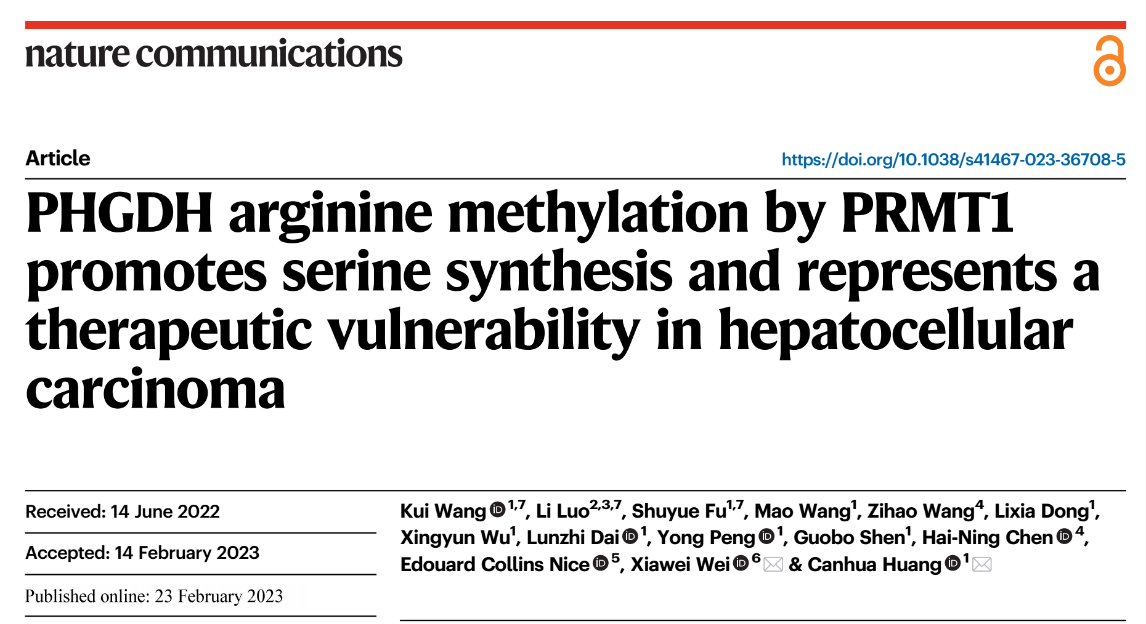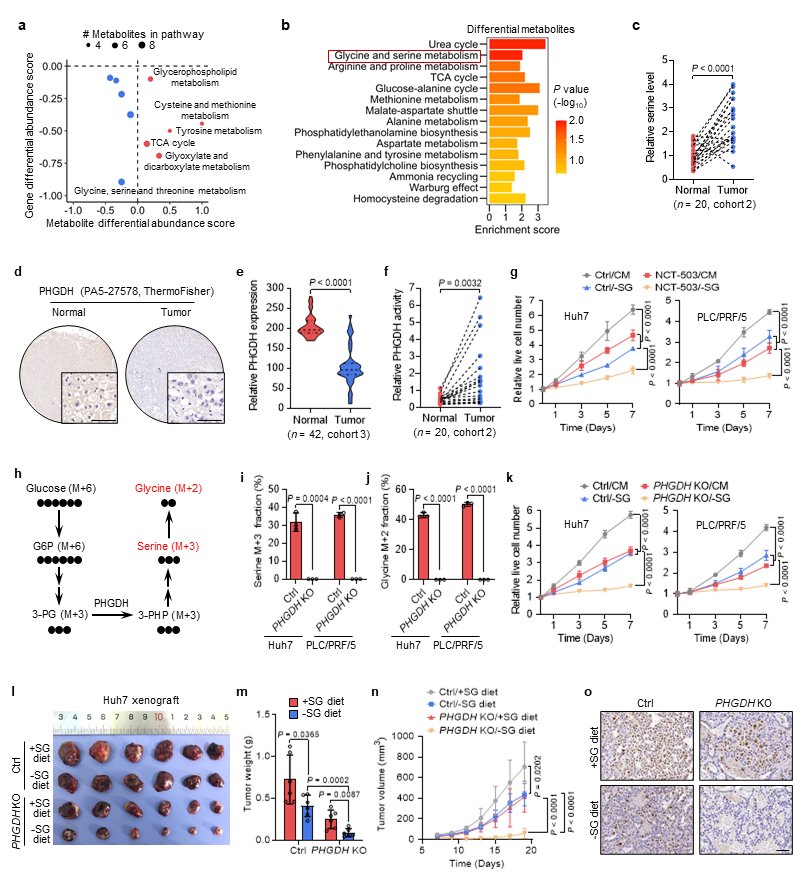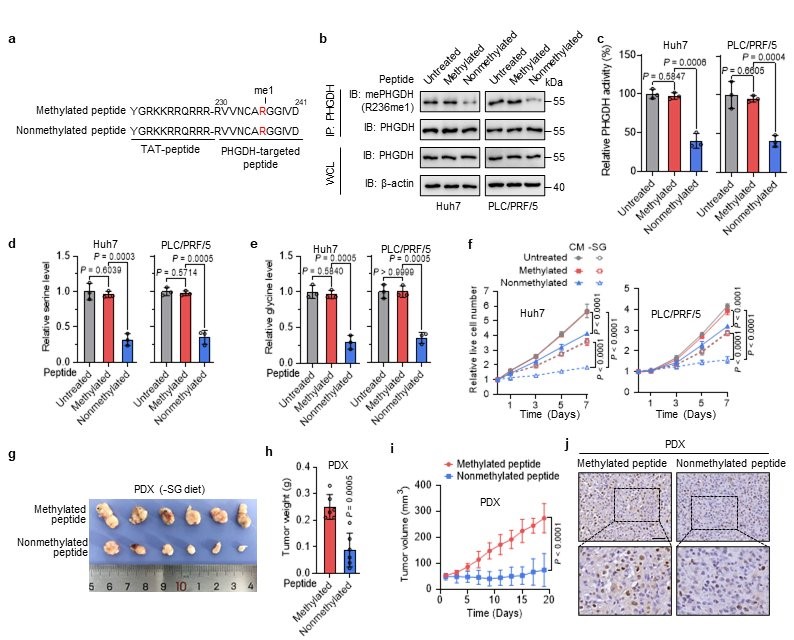The research team of Canhua Huang, Xiawei Wei and Kui Wang has published a paper entitled "PHGDH Arginine Method by PRMT1 Promotes Series Synthesis and Representatives a Therapeutic Vulnerability in Hepatocellular Carcinoma" online in Nature Communications, revealing the new mechanism of serine metabolism in tumors.Prof. Canhua Huang of the State Key Laboratory of Biotherapy of West China Hospital and Prof. Xiawei Wei of the National Geriatric Clinical Center of West China Hospital are the co corresponding authors of this paper. Kui Wang, an associate research fellow of the West China School of Basic Medical Sciences and Forensic Medicine, Li Luo, an assistant research fellow of the West China Second University Hospital, and Shuyue Fu, a doctoral candidate of the State Key Laboratory of Biotherapy, contribute equally to this paper as the first author.

Metabolism abnormality is one of the important biological characteristics of tumor cells. It is of great significance to explore the regulatory mechanism of tumor metabolism abnormality to clarify the molecular mechanism of tumor occurrence and development, and is expected to provide potential new targets for clinical tumor treatment. “Cancer cells commonly reprogram metabolic patterns to meet their biomass demands for rapid and sustainable growth. Serine metabolism is activated in diverse cancer types to support tumor growth and metastasis, by providing precursors for macromolecule (such as proteins, nucleotides, and lipids) synthesis and once-carbon units for methylation reactions. Moreover, serine synthesis coupling one-carbon metabolism produces glutathione (GSH) and NADPH, two main intrinsic antioxidant agents, to maintain redox balance in cancer cells. The intracellular serine pool required for serine metabolism in cancer cells can be replenished by extracellular import or de novo biosynthesis. Accordingly, serine metabolism-targeting strategies, including dietary serine/glycine restriction, serine synthesis inhibition, or a combination of each, have been recently explored and exhibit favorable effects for cancer treatment. However, the underlying mechanism by which serine synthesis is regulated in cancer remains largely unknown.” (Introduction)

Fig. 1: Elevated PHGDH catalytic activity is required for HCC growth

Fig. 2 Arginine methylation at R236 elevates PHGDH catalytic activity by increasing substrate affinity
“Serine synthesis is crucial for tumor growth and survival, but its regulatory mechanism in cancer remains elusive. Here, using integrative metabolomics and transcriptomics analyses, we show a heterogeneity between metabolite and transcript profiles. Specifically, the level of serine in hepatocellular carcinoma (HCC) tissues is increased, whereas the expression of phosphoglycerate dehydrogenase (PHGDH), the first rate-limiting enzyme in serinebiosynthesis pathway, is markedly downregulated. Interestingly, the increased serine level is obtained by enhanced PHGDH catalytic activity due to protein arginine methyltransferase 1 (PRMT1)-mediated methylation of PHGDH at arginine 236. PRMT1-mediated PHGDH methylation and activation potentiates serine synthesis, ameliorates oxidative stress, and promotes HCC growth in vitro and in vivo. Furthermore, PRMT1-mediated PHGDH methylation correlates with PHGDH hyperactivation and serine accumulation in human HCC tissues, and is predictive of poor prognosis of HCC patients. Notably, blocking PHGDH methylation with a TAT-tagged nonmethylated peptide inhibits serine synthesis and restrains HCC growth in an HCC patient-derived xenograft (PDX) model and subcutaneous HCC cell-derived xenograft model. Overall, our findings reveal a regulatory mechanism of PHGDH activity and serine synthesis, and suggest PHGDH methylation as a potential therapeutic vulnerability in HCC.”

Fig. 3:PRMT1 interacts with, methylates, and activates PHGDH

Fig. 4: R236 methylation of PHGDH mediated by PRMT1 promotes serine synthesis and ameliorates oxidative stress
This study revealed the new mechanism of regulating the activity of PHGDH, the rate-limiting enzyme of serine synthesis, and the metabolism of serine. It suggested that PHGDH arginine methylation could be a potential target for the treatment of liver cancer, providing a new idea for clinical treatment of liver cancer.
https://www.nature.com/articles/s41467-023-36708-5
